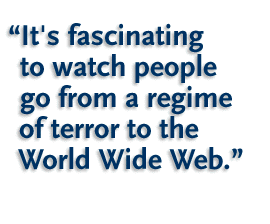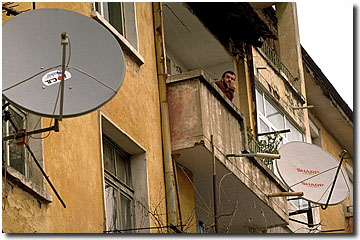 or 45 years the people of Albania, ruled by a dictator who thought Stalin was too soft, had no contact with the outside world. Before the collapse of the xenophobic regime in 1990, an Albanian could get eight years in jail for merely talking to a foreigner. It's still early in Albania's post-revolutionary era, but the small, mountainous country, squeezed between Greece and the former Yugoslavia, has just taken its first steps toward joining the rest of the world online.
or 45 years the people of Albania, ruled by a dictator who thought Stalin was too soft, had no contact with the outside world. Before the collapse of the xenophobic regime in 1990, an Albanian could get eight years in jail for merely talking to a foreigner. It's still early in Albania's post-revolutionary era, but the small, mountainous country, squeezed between Greece and the former Yugoslavia, has just taken its first steps toward joining the rest of the world online.Like many former Communist countries, Albania needs a lot of help moving toward a free-market economy. That's where cyberspace comes in: The United Nations Development Program (UNDP) recently launched Albania's first node on the Internet as a way to help government agencies, science and research institutes, and other organizations coordinate their efforts in the Albanian transition.
The UNDP project won't be transforming the Albanian populace into cybersophisticates anytime soon: By government decree, Internet access is still restricted to UNDP staff, the Fultz Technical School of Tirana (Albania's capital), Tirana University, and a few other select groups."Everything to do with the Internet is still an experiment," explains Peter Schumann, the resident representative of UNDP-Albania. "So far, the reactions range from, 'My God, this is impossible' to 'We have to control it.' It's fascinating to watch people go from a regime of terror to the World Wide Web."
At the Fultz school, the bleak future of graduating students, rather than cyberspace, is the big issue of the day. "We are preparing them for business jobs, but where's the job market in Albania?" asks Donald Leka, director of the Fultz Foundation in Washington D.C.. The Net isn't a silver-bullet solution that will work wonders in Albania, but it is widening the student's intellectual horizons. "Now people can get information without anyone looking over their shoulders," says Peter.







